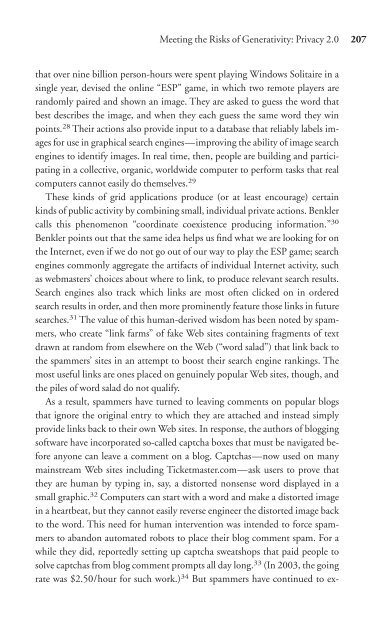Download - Future of the Internet â And how to stop it.
Download - Future of the Internet â And how to stop it.
Download - Future of the Internet â And how to stop it.
You also want an ePaper? Increase the reach of your titles
YUMPU automatically turns print PDFs into web optimized ePapers that Google loves.
Meeting <strong>the</strong> Risks <strong>of</strong> Generativ<strong>it</strong>y: Privacy 2.0 207<br />
that over nine billion person-hours were spent playing Windows Sol<strong>it</strong>aire in a<br />
single year, devised <strong>the</strong> online “ESP” game, in which two remote players are<br />
randomly paired and s<strong>how</strong>n an image. They are asked <strong>to</strong> guess <strong>the</strong> word that<br />
best describes <strong>the</strong> image, and when <strong>the</strong>y each guess <strong>the</strong> same word <strong>the</strong>y win<br />
points. 28 Their actions also provide input <strong>to</strong> a database that reliably labels images<br />
for use in graphical search engines—improving <strong>the</strong> abil<strong>it</strong>y <strong>of</strong> image search<br />
engines <strong>to</strong> identify images. In real time, <strong>the</strong>n, people are building and participating<br />
in a collective, organic, worldwide computer <strong>to</strong> perform tasks that real<br />
computers cannot easily do <strong>the</strong>mselves. 29<br />
These kinds <strong>of</strong> grid applications produce (or at least encourage) certain<br />
kinds <strong>of</strong> public activ<strong>it</strong>y by combining small, individual private actions. Benkler<br />
calls this phenomenon “coordinate coexistence producing information.” 30<br />
Benkler points out that <strong>the</strong> same idea helps us find what we are looking for on<br />
<strong>the</strong> <strong>Internet</strong>, even if we do not go out <strong>of</strong> our way <strong>to</strong> play <strong>the</strong> ESP game; search<br />
engines commonly aggregate <strong>the</strong> artifacts <strong>of</strong> individual <strong>Internet</strong> activ<strong>it</strong>y, such<br />
as webmasters’ choices about where <strong>to</strong> link, <strong>to</strong> produce relevant search results.<br />
Search engines also track which links are most <strong>of</strong>ten clicked on in ordered<br />
search results in order, and <strong>the</strong>n more prominently feature those links in future<br />
searches. 31 The value <strong>of</strong> this human-derived wisdom has been noted by spammers,<br />
who create “link farms” <strong>of</strong> fake Web s<strong>it</strong>es containing fragments <strong>of</strong> text<br />
drawn at random from elsewhere on <strong>the</strong> Web (“word salad”) that link back <strong>to</strong><br />
<strong>the</strong> spammers’ s<strong>it</strong>es in an attempt <strong>to</strong> boost <strong>the</strong>ir search engine rankings. The<br />
most useful links are ones placed on genuinely popular Web s<strong>it</strong>es, though, and<br />
<strong>the</strong> piles <strong>of</strong> word salad do not qualify.<br />
As a result, spammers have turned <strong>to</strong> leaving comments on popular blogs<br />
that ignore <strong>the</strong> original entry <strong>to</strong> which <strong>the</strong>y are attached and instead simply<br />
provide links back <strong>to</strong> <strong>the</strong>ir own Web s<strong>it</strong>es. In response, <strong>the</strong> authors <strong>of</strong> blogging<br />
s<strong>of</strong>tware have incorporated so-called captcha boxes that must be navigated before<br />
anyone can leave a comment on a blog. Captchas—now used on many<br />
mainstream Web s<strong>it</strong>es including Ticketmaster.com—ask users <strong>to</strong> prove that<br />
<strong>the</strong>y are human by typing in, say, a dis<strong>to</strong>rted nonsense word displayed in a<br />
small graphic. 32 Computers can start w<strong>it</strong>h a word and make a dis<strong>to</strong>rted image<br />
in a heartbeat, but <strong>the</strong>y cannot easily reverse engineer <strong>the</strong> dis<strong>to</strong>rted image back<br />
<strong>to</strong> <strong>the</strong> word. This need for human intervention was intended <strong>to</strong> force spammers<br />
<strong>to</strong> abandon au<strong>to</strong>mated robots <strong>to</strong> place <strong>the</strong>ir blog comment spam. For a<br />
while <strong>the</strong>y did, reportedly setting up captcha sweatshops that paid people <strong>to</strong><br />
solve captchas from blog comment prompts all day long. 33 (In 2003, <strong>the</strong> going<br />
rate was $2.50/hour for such work.) 34 But spammers have continued <strong>to</strong> ex-


